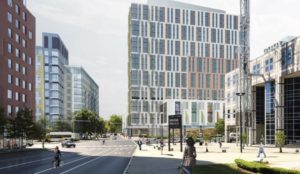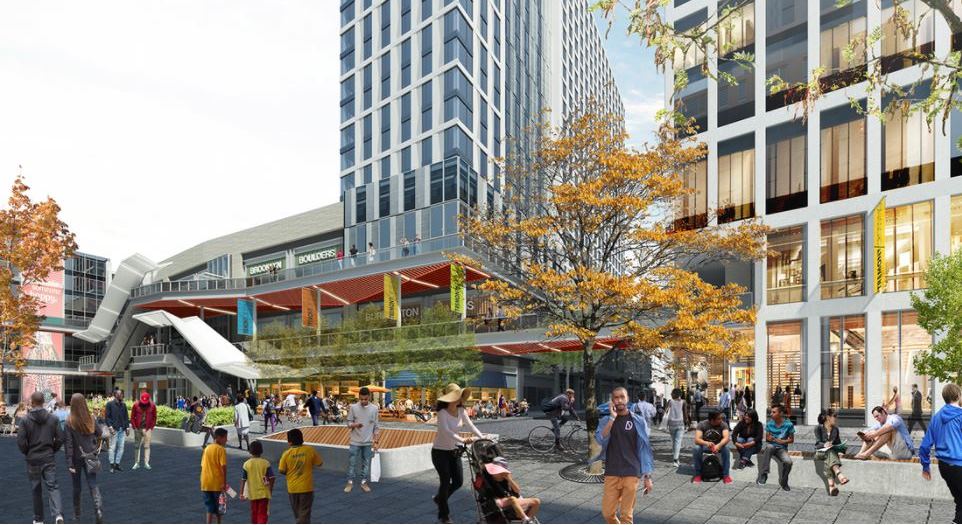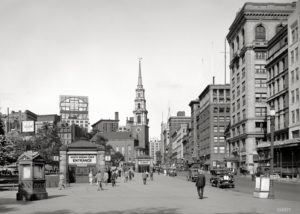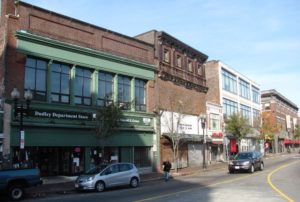Dudley Square was once one of the thriving hearts of the working-class Roxbury neighborhood of Boston, Massachusetts. It has long been the center of African American culture in Boston, prior to which the area was primarily Jewish.
For most of the twentieth century, Dudley Square was a multi-mode transportation hub, centered at Dudley Station of the Washington Street Elevated train line.
Several streetcar lines radiated to surrounding neighborhoods from the elevated station.
Then, car-oriented urban planners dismantled their elevated train in 1987, greatly reducing Roxbury’s connection to the city. The streetcars werealso killed in the name of automobile worship. A long period of decline followed.
In 1969, Bostonians rose up against a massive plan to build two insensitive, incompetently-planned urban freeways, I-95 and I-695, through the city and several inner-ring suburbs.
By the time the state stopped the project in early 1970, eminent domain seizures had already slashed through several Boston neighborhoods, leaving vacant strips of land where houses had stood.
Worst off was Roxbury. The two freeways would’ve met a half-mile northwest of Dudley Square, and the canceled project left a crescent-shaped stretch of vacant land there at Tremont Street.
Now, the biggest redevelopment effort planned around Dudley Square is the most controversial: Tremont Crossing, a $319 million mix of big-box retail, 718 apartments, and a new home for Boston’s Museum of the National Center for Afro-American Artists.
 Tremont Crossing would be Roxbury’s largest redevelopment project in decades and it would finally fill the crescent-shaped hole left by the canceled highway project. In March of 2017, it received a preliminary approval from the Boston Planning and Development Agency (BPDA), after a feisty debate that divided Roxbury’s community leaders.
Tremont Crossing would be Roxbury’s largest redevelopment project in decades and it would finally fill the crescent-shaped hole left by the canceled highway project. In March of 2017, it received a preliminary approval from the Boston Planning and Development Agency (BPDA), after a feisty debate that divided Roxbury’s community leaders.
Tito Jackson, Roxbury’s city councilor, calls Tremont Crossing a “missed opportunity,” a potential “gentrification accelerator,” and “an example of how we should not proceed.”
Jackson calls Roxbury’s public land—especially those parcels seized for the canceled freeway project, like the Tremont Crossing parcel—the residents’ birthright. “It should be for the furtherment of the people of Roxbury,” Jackson says, “those who’ve been left behind, those who’ve been economically disenfranchised.”
Long-time Dudley Square resident Valerie Shelley, a former school board employee, is president of the tenants’ association in Orchard Gardens, an apartment complex built in 1999 on the former site of a public housing project.
She doesn’t want Dudley Square to go the way of the neighboring South End, once a working-class part of town, where condominiums now sell for $800,000 or more.
“I don’t have a problem with the changes. Who doesn’t want a better community?” Shelley says. “But let’s not move us out. Don’t make it better on the backs of other people.”
 Tremont Crossing is a 1.2 million square foot, mixed-use redevelopment project at the Tremont Street / Melnea Cass Corridor, near major vehicular arteries and abundant mass transit.
Tremont Crossing is a 1.2 million square foot, mixed-use redevelopment project at the Tremont Street / Melnea Cass Corridor, near major vehicular arteries and abundant mass transit.
The redevelopment is intended to be a transformative addition to the fabric of Roxbury, becoming a destination for entertainment, the arts and education as well as shopping, dining and living.
The complex will consist of approximately 105,000 square feet of Class A office space, 400,000 square feet of destination and neighborhood retail, 655,000 square feet of market rate residential (727 units), a 31,000 square foot museum, and a 1,371-space parking garage.
 When completed, the project will present a new gateway to the City with its commanding presence at the corner of Tremont Street and Whittier Street at the junction of Boston’s Roxbury, South End, and Longwood Medical Area (LMA) neighborhoods.
When completed, the project will present a new gateway to the City with its commanding presence at the corner of Tremont Street and Whittier Street at the junction of Boston’s Roxbury, South End, and Longwood Medical Area (LMA) neighborhoods.
“I think Dudley is on the cusp of the kind of renewal it’s been hoping for for decades,” says Kathy Kottaridis, executive director of Historic Boston Inc., a preservation organization headquartered in Dudley. “But the question is, who will live here? Who will the development and expansion benefit?”
All images courtesy of Tremont Crossing unless otherwise credited.



